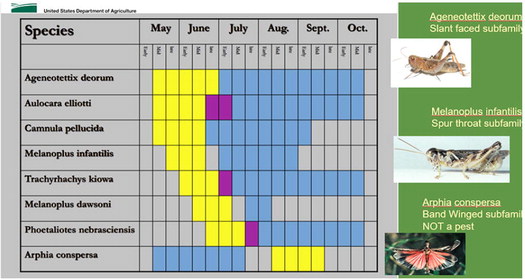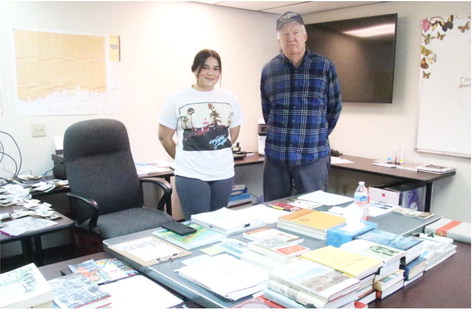New Fort Peck Producers Meeting Covers Grasshoppers


Grasshoppers are everywhere in Eastern Montana this year, so it was fittingly that grasshoppers were the topic for the first Fort Peck producer meeting held in Poplar on Wednesday, Aug. 18.
Meghan Edwards, Fort Peck Community College’s ag Extension coordinator, noted the meeting provided great conversation regarding pest management, gardening and hopes for the future. Insight was shared from Dr. David Branson of the U.S. Northern Plains Agricultural Research Laboratory in Sidney.
The following information was shared regarding grasshopper management: * Spray apple cider vinegar and Dawn dish soap directly onto plants. It will paralyze small grasshoppers and make them easy to remove or leave them to drown in the rain or be eaten by birds.
* Grasshoppers are most vulnerable when they are small. If you can get Dimilin, a more controlled pesticide than Sevin, you can spray when they are hatchlings and they will not be able to grow their adult exoskeletons.
* Sprinkling plain flour on soil in the fall seems to help disrupt eggs, but it’s messy.
* A border of Sevin (a nerve agent) around the garden and in neighboring alleys is helpful. In extreme cases, spraying the garden directly also helps, but the barrier around the garden is key.
* Cats and birds both like hunting grasshoppers. Planting berry bushes and other plants to encourage birds can help control insects * Simply walking through the garden once every few hours can chase many grasshoppers away * Purchasing mesh netting to cover plants can be worthwhile, especially for extra- vulnerable plants (or the ones you really don’t want to lose!)
The next producer meeting is set for Wednesday, Sept. 21.
Possible topics for future meetings will include hydroponics and container gardening; packaging and storing seeds long term; starting plants indoors from seed; soil health and composting; beekeeping; mentorships to get more people to start gardening; and community service/ helping in gardens as job training for incarcerated people.
For more information, contact Edwards at 406-768-6329.

